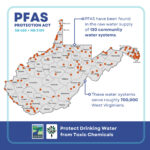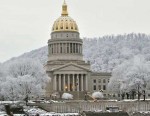- Share on Facebook
- Like
- Digg
- Tumblr
- VKontakte
- Buffer
- Love This
- Odnoklassniki
- Meneame
- Blogger
- Amazon
- Yahoo Mail
- Gmail
- AOL
- Newsvine
- HackerNews
- Evernote
- MySpace
- Mail.ru
- Viadeo
- Line
- Comments
- SMS
- Viber
- Telegram
- Subscribe
- Skype
- Facebook Messenger
- Kakao
- LiveJournal
- Yammer
- Edgar
- Fintel
- Mix
- Instapaper
- Copy Link
- Bluesky
By Lucia Valentine and Maria Russo
Yesterday was the official halfway point of the 2023 Legislative Session! As we head into the second half, we are changing the format of our weekly round-up to a breakdown of bills we are working on getting passed and those we are trying to defeat, along with steps you can take.
The last day for bills to be introduced in the House is February 14; in the Senate, it’s February 20. Crossover day is quickly approaching on March 1!
Bills We Support
ENERGY
HB 2159 – Establishing a community solar program for subscribers to gain credits against their utility bills
Sponsors: Hansen
Last Action: Referred to House Energy and Manufacturing on 1/11
Summary: This bill would establish a community solar program in West Virginia, legalizing the ability for subscribers to gain credits against their utility bills. Since only around 34% of homes qualify for rooftop solar projects, this would allow access to solar energy for people who otherwise would not be able to benefit. We are working on securing bipartisan support for this bill in both the House and Senate.
SB 448 – Providing funding for the Department of Environmental Protection’s (DEP) Office of Oil and Gas
Sponsors: Smith (Lead), Clements, Woodrum
Last Action: Passed Senate Energy Committee on 2/1 and awaits action in Senate Finance
Summary: Provides additional funding to the DEP’s Office of Oil and Gas (OOG) for increased inspectors for oil and gas wells. SB 448 and HB 3110 take a tiered approach to a fee structure and take 0.75% of the severance tax towards inspection increases. This approach provides the OOG with $2.1 million and would allow the WVDEP to increase inspectors from 10 to around 20, less than the 40 inspectors needed to align WV with the oversight capacity of PA and OH.
HB 3110 – Relating to funding for the DEP’s Office of Oil and Gas. Companion bill to SB 448 (above)
Sponsors: Anderson (Lead), Zatezalo, Horst, Hansen, Fehrenbacher, Cooper, Martin, Young, Hardy, Heckert
Last Action: Passed House Energy on 2/3 and awaits action in House Finance
SB 13 – Establishing annual oversight fee for wells producing more than 10,000 cubic feet of gas per day
Sponsors: Smith
Last Action: Passed Senate Energy on 2/3 and awaits action in Senate Finance
Summary: Provides additional funding to the DEP’s Office of Oil and Gas (OOG) for increased inspectors for oil and gas wells and an annual oversight fee per well, with a $100 fee for wells producing 10 MCF/day of gas or greater. This would get the OOG back to 1 inspector per ~4,000 wells.
HB 2021 – Relating to funding for the DEP’s Office of Oil and Gas
Sponsors: Hansen
Last Action: Introduced on 1/11 and has been referred to House Energy, then Finance
Summary: Different from SB13 (above), it requires that all wells pay an annual fee of $100, resulting in approximately $6.5M for OOG annually.
Action Opportunity: Please contact the Senate Finance Committee regarding SB 448 and the House Finance Committee regarding HB 3110. The message: Please bring West Virginia in line with our neighbors in Pennsylvania and Ohio to fully staff the WV DEP’s Office of Oil and Gas inspectors to help ensure proper enforcement of regulations and safeguard public health.
CLEAN DRINKING WATER
HB 3189 – The PFAS Protection Act
Sponsors: Riley (Lead), Hansen, Westfall, Clark, Horst, Hanshaw (Mr. Speaker), Hornby, Steele, Storch, Hardy, Hillenbrand
Last Action: Passed the House Energy Committee on 2/9; heads to House Judiciary
Summary: The PFAS Protection Act is a follow-up to the Department of Environmental Protection’s (DEP) 2020 study, which found alarming amounts of PFAS in over 130 water systems in West Virginia (49% of systems). This legislation requires the DEP to develop action plans to identify and address the sources of PFAS in raw water, requires the industry to monitor and report PFAS discharges, and establishes statewide limits on PFAS discharges into water supplies immediately upon the EPA’s issuance of recommended criteria (coming soon). Ultimately, the PFAS Protection Act helps hold polluters responsible for cleaning up PFAS, not water utilities or their ratepayers.
SB 485 – PFAS Protection Act
Sponsors: Smith (Lead), Caputo, Oliverio, Jeffries, Plymale, Rucker, Woodrum, Barrett, Queen, Woelfel, Chapman, Trump, Hamilton
Last Action: Passed the Senate Agriculture & Natural Resources Committee on 2/6; moving on to Finance
Summary: SB 485 was replaced by HB 3189 through a committee substitute in the Senate Agriculture & Natural Resources Committee. Please see the description of HB3189 above.
Action Opportunity: Please contact the Senate Finance Committee regarding SB 485 and the House Judiciary Committee regarding HB 3189. The message: Please add the PFAS Protection Act to the (Finance/Judiciary) committee agenda and support this legislation. West Virginians deserve clean drinking water, and this bill protects our water systems across the state from toxic chemical pollution. You can also email House Judiciary Committee members here.
Bills We Oppose
ZONING
HB 2459 – To clarify the application of zoning requirements to exempt wholesale generators
Sponsors: Clark
Last Action: Referred to the House Judiciary on 1/11. The bill died in committee but may be reworked and reintroduced.
Summary: This legislation seeks to exempt wholesale generators from zoning ordinances. This would allow large-scale energy projects to avoid following local zoning codes. An exemption like this takes away protections in residential areas and has the power to change the landscape of communities.
FOREST CARBON SEQUESTRATION
HB 3294 – Ensuring future economic development with limitations, excise tax, and registration requirements of carbon offset agreements
Sponsors: Anderson, Zatezalo, Westfall, Fehrenbacher, Street, Crouse, Heckert, Bridges, Holstein, Cooper, Hanshaw (Mr. Speaker)
Last Action: Passed House Energy committee on 2/8 and awaits action in House Finance
Summary: Both of these bills change the Managed Timberland Program that threatens landowners 1.) eligibility in the program even if a landowner chooses to harvest timber 2.) imposes new taxes that limit landowners’ choices 3.) dictates the types of contracts landowners can enter. This bill would effectively kill the opportunity and incentive for landowners to practice stewardship and gain forestry support to maintain their managed timberland.
SB 595 – Relating to real property, tax, and registration requirements associated with carbon offset agreements
Sponsors: Tarr, Martin, Woodrum
Last Action: Introduced in the Senate on 2/9 and referred to the Finance committee
Summary: See the above summary.
Action Opportunity: Please contact the Senate Finance Committee regarding SB 595 and the House Finance Committee regarding HB 3294. The message: I urge you to vote NO on HB 3294/SB 595 and reject this harmful policy that threatens the freedom of West Virginia forest owners. The Nature Conservancy and the West Virginia Land and Mineral Owners Association also oppose these bills. Here’s more on the discussion of HB 3294 in the House Energy and Manufacturing Committee from WV Metro News and the Morgantown Dominion Post this week.
PUBLIC LANDS
SB 468 – Continuing Cabwaylingo State Forest Trail System
Sponsors: Hamilton, Maynard, Stover, Plymale, Taylor, Stuart, Karnes
Last Action: Committee Substitute failed to pass last week. Awaiting possible new action in Senate Outdoor Recreation Committee next week
Action Opportunity: Contact Senate Outdoor Recreation Committee members and tell them WV citizens do NOT want off-road vehicles on our state parks, forests, wildlife areas and rail trails.
Before we let you go, here’s one more quick action to take by Monday, February 13:
Stop climate change, and protect clean air: Over half of West Virginians live within a mile of an active oil and gas well. Methane and other toxic pollution from oil and gas systems pose health risks to the public and worsen climate change. Learn more about the public health and climate impacts of methane pollution and how to take action in this brief webinar. Submit a public comment to the EPA today. The deadline for comments is Monday, February 13!
Now that we are halfway through, we expect things to intensify and move quickly over the next few weeks. Keep an eye out for action alerts! If you have any questions or concerns about any bills, please reach out to Lucia Valentine (luciavalentine10@gmail.com) or Maria Russo (maria.spring.russo@gmail.com).
Have a great weekend!








